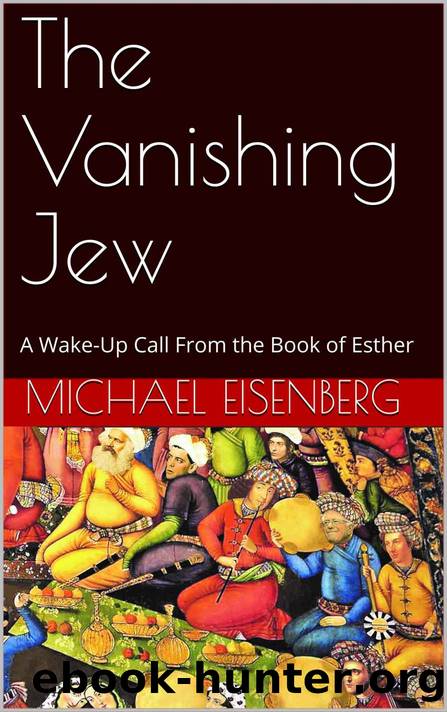The Vanishing Jew: A Wake-Up Call From the Book of Esther by Eisenberg Michael

Author:Eisenberg, Michael [Eisenberg, Michael]
Language: eng
Format: epub
Publisher: UNKNOWN
Published: 2020-02-14T00:00:00+00:00
Because the Fear of Mordechai had Fallen upon Them
C
hapter 9 continues the focus on Mordechai: And so, on the thirteenth day of the twelfth month â that is, the month of Adar â when the kingâs command and decree were to be executed, the very day on which the enemies of the Jews had expected to get them in their power, the opposite happened, and the Jews got their enemies in their power. Throughout the provinces of King Ahashverosh, the Jews assembled in their cities to attack those who sought their hurt; and no one stood in their way, for the fear of them had fallen upon all the peoples. Indeed, all the officials of the provinces â the satraps, the governors, and the kingâs stewards â championed the Jews, because the fear of Mordechai had fallen upon them. For Mordechai was now powerful in the royal palace, and his fame was spreading through all the provinces; the man Mordechai was growing ever more powerful. (9:1-4)
Ten months had passed since Mordechai issued his letter in the name of the king. Mordechai and the Jews seem to have used their time well, organizing for the decisive day â the very same day on which the kingâs previous orders were to be carried out. What did Persiaâs Jew-haters do in the meantime? Nothing at all. They wanted to harm the Jewish people, but in reality they did nothing.
R. Benny Lau notes that although Mordechaiâs edict gave the Jews the right to plunder their enemies (âand plunder their possessionsâ) â the same right granted by Haman to the enemies of the Jews â the Jews desisted. The text emphasizes this, stating on three separate occasions: âBut they did not lay hands on the spoil.â According to R. Lau:
This is the difference between an unruly mob that operates without discipline and without direction and a nation that assembles in self-defense. Jew-haters attempt to besmirch and criminalize the Jews by describing the battle in the cities of the Persian Empire in terms of lack of restraint and primal dissolution. However, Scripture bears witness to their restraint in battle, even as they added another day of fighting so they could complete their triumph over their enemies.
These events, R. Lau emphasizes, drew the attention of many exegetes and scholars. Some developed theories about Jewish bloodlust, and others engaged in apologetics. I am inclined to think that this episode can be understood if we begin our reading from the last verse in chapter 8.
Firstly, it is important to consider this issue from a demographic perspective. In the time period under discussion â the fifth century BCE
â it is estimated that there were 100 million people in the world, 15 million in South America, and the remaining 85 million in the Mediterranean basin, Africa, Europe and Asia. The Megilah tells us that on the thirteenth of Adar, the Jews killed 75,000 people. In other words, about one per mil of the worldâs population was wiped out on the thirteenth of Adar of the twelfth year of Ahashveroshâs reign.
Download
This site does not store any files on its server. We only index and link to content provided by other sites. Please contact the content providers to delete copyright contents if any and email us, we'll remove relevant links or contents immediately.
| Haggadah | Hasidism |
| History | Holidays |
| Jewish Life | Kabbalah & Mysticism |
| Law | Movements |
| Prayerbooks | Sacred Writings |
| Sermons | Theology |
| Women & Judaism |
The Power of Habit by Charles Duhigg(3117)
Man's Search for Meaning by Viktor E. Frankl(2661)
Mckeown, Greg - Essentialism: The Disciplined Pursuit of Less by Mckeown Greg(2413)
MOSES THE EGYPTIAN by Jan Assmann(2408)
Devil, The by Almond Philip C(2322)
The Complete Dead Sea Scrolls in English (7th Edition) (Penguin Classics) by Geza Vermes(2269)
Unbound by Arlene Stein(2266)
I Capture the Castle by Dodie Smith(2028)
Schindler's Ark by Thomas Keneally(1869)
The Invisible Wall by Harry Bernstein(1797)
The Gnostic Gospel of St. Thomas by Tau Malachi(1779)
The Bible Doesn't Say That by Dr. Joel M. Hoffman(1674)
The Secret Doctrine of the Kabbalah by Leonora Leet(1600)
Political Theology by Carl Schmitt(1568)
The Jewish State by Theodor Herzl(1526)
A History of the Jews by Max I. Dimont(1517)
The Dead Sea Scrolls Bible by Martin G. Abegg(1500)
The Book of Separation by Tova Mirvis(1479)
Oy!: The Ultimate Book of Jewish Jokes by David Minkoff(1360)
